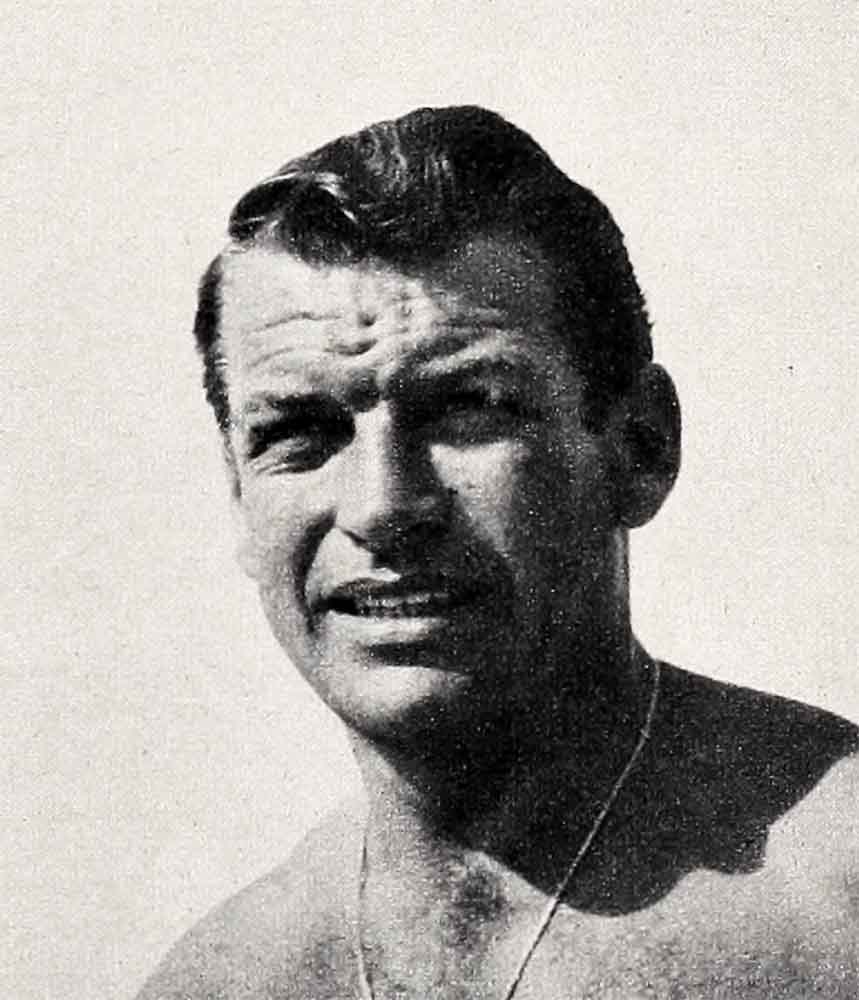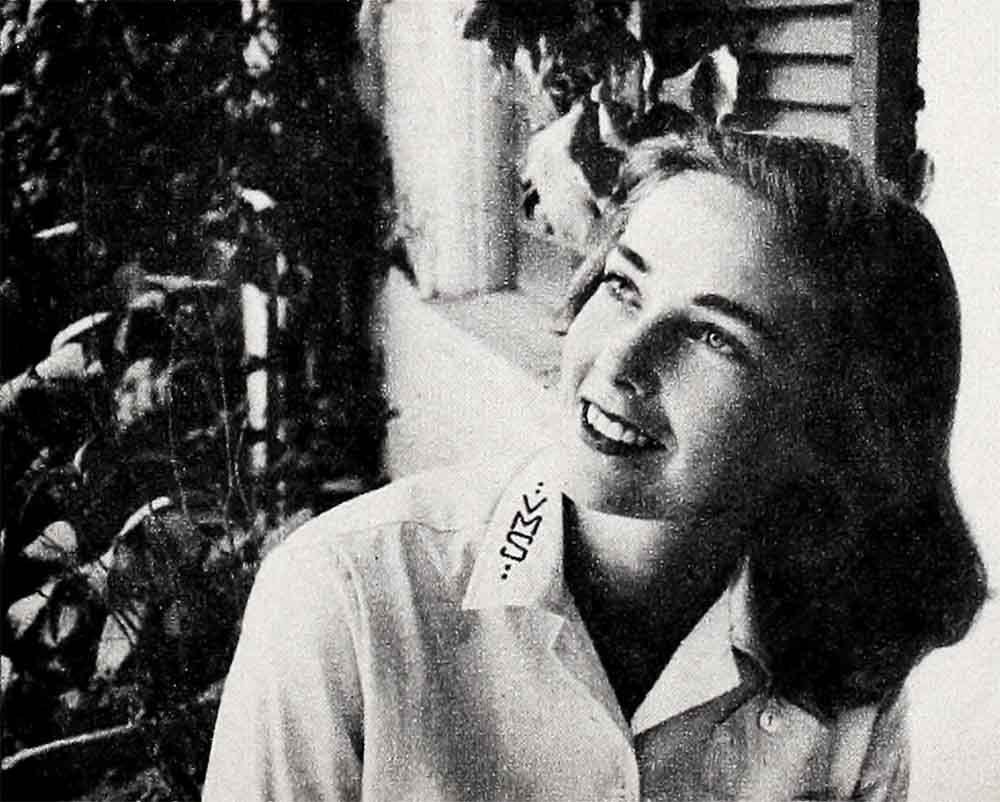What You Don’t Know About Job-Hunting?

Are you a teen-ager looking for a summer job? A housewife seeking ways to pad the family income? Or maybe planning to take that big step and embark on a career? Whatever the case, you are probably asking yourself: What am I best qualified to do? What will I most enjoy doing? With a bewildering array of more than thirty thousand occupations to choose from, it’s not easy to select the one that suits you best.
To help you find that job and to avoid the pitfalls that lie in the way of a successful career Photoplay asked Maxine Block to talk with Hollywood’s top stars so that they might pass along to you their own formulas for getting ahead—tips on how to make your job pay off in happiness as well as cash; ways to help you move ahead in a career.
For three months Maxine Block knocked on the dressing room doors of the stars and on the doors of Hollywood job counselors, employment agency heads, personnel managers and prominent business executives.
One fact everybody agreed on. Do what you like and like what you do. Set your goal and never take your eye off it. “Most of Hollywood’s best-known actors and actresses,” said one studio head, “began their careers performing the lowliest chores, but while they made the rounds of producers’ offices or clerked in stores they never forgot that they wanted to act—often against strong advice to quit and stop reaching for the stars.

ESTHER WILLIAMS
Find out what you do want to do—and then get behind it and push. Susan Hayward says, “The best way to keep someone else from choosing your career for you is to have interests and ideas of your own. Weigh everyone’s advice but in the end make your own decisions. You’ll work ten times as hard to make your job a success.”
And Esther Williams adds, “If you merely dream how nice it would be to have some extra money but have no real objective in mind, you may not make the necessary effort to get the right job or even keep it after you have it. So, don’t take a job unless you are determined to do your best.”
And Pat Boone insists that, “Education is the best investment for getting a new job.”
“There are kids,” Pat says, “who get themselves summer jobs, fall in love with the independence and the money, and then don’t return to school in the fall. This, I believe, is a terrible mistake, one that they will regret all their lives. From the beginning Shirl and I insisted that we’d let nothing—my singing, our marriage, our children—interfere with getting an education.”
But Pat has learned, too, that you have to work for the things you really want in this world. He learned respect for a dollar at the tender age of fifteen.
“Dad put me to work digging ditches at fifty cents an hour. I remember at the end of the first day I was so bone tired I could hardly get the shovel off the ground empty, to say nothing of lifting a load of dirt.

ROBERT MITCHUM
“After that session with the shovel I knew e value of money. And I thought for a long time before I spent a quarter for a movie. I also knew that if I was going to get the education I wanted that I was going to have to save up for it. All during high school I put money away for when I went to college.”
Pat and Shirley haven’t forgotten the days, not so very long ago, either, when things like milk shakes were real treats, something you saved up for.
“And how much better they tasted because you did,” Pat concludes.
And Susan Hayward’s advice to young people is, “talk over your career with older friends, your parents and teachers.
“I never wanted to be anything but an actress as far back as I can remember. Other kids on my block in Brooklyn wanted to be firemen one year and ball players the next, girls were torn between nursing and teaching school. It was acting or nothing for me. Of course, nobody believed I had any talent. Certainly not the booing audiences in the amateur night contests.”
Undiscouraged, Susan Hayward temporarily buried her ambition to be an actress in order to help out her family. At twelve, she became the first girl with a news- paper route for the Brooklyn Eagle. At fourteen, a fat little freckle-faced redhead, Susan yielded her newspaper career for a turn at modeling clothes for other fat little fourteen-year-olds. It wasn’t until she entered high school that Susan was able to make her dreams as an actress come true.
Her English teacher felt Susan had real ability and encouraged her to become an actress. “I was terribly shy then,” Susan recalls, “but Miss O’Grady urged me to join the drama group, called on me often in class so that I’d learn poise and acquire assurance and even consoled me when I cried my eyes out because I didn’t get the lead in a school play. Bless Florence O’Grady, I only wish every girl had a teacher like her.
“I remember in high school,” Susan recalls, “I selected for a term project the subject of how to become an actress. I lived with it night and day. I took the subway from Brooklyn to Manhattan every afternoon after school and steeped myself in the theatre. I was terribly scared but I managed to wangle my way into star’s dressing rooms. I talked to agents and producers, even the prop men and the electricians, anybody who could fill me in on the theatre. I like to think that it finally paid off.”

JEAN SIMMONS
Stars like Anthony Franciosa drifted from job to job after they got out of school. They were sort of feeling their way around. But for all of them there came a time when they knew that they wanted to be actors. Had to be actors. Tony says, “Once you know what you want to do, go to it and hang on at all cost.”
“I didn’t give a hoot for school,” Tony explains, “and at sixteen I just cut out like a lot of other kids though there wasn’t any special work I was interested in. Looking back now I realize what a big mistake that was.”
Tony started out as an awning installer—like Rock Hudson—then he was a dishwasher in a hamburger joint, worked as a welder and then later lugged heavy lead forms in a printing plant. “My jobs,” explains the intense, black-haired, hazel-eyed young actor, “were dull, boring and they never lasted longer than a month or two.
“Then when I was eighteen I discovered the theater and acting. A friend was going to try out for a small part in an amateur play and asked me to go along. When the director saw me, he asked if I was interested in taking a part, too. Well, I did and it went pretty well and a whole new world opened up for me.”
A few years later Tony saw his name up in lights on Broadway in “A Hatful of Rain” in a role that he’s repeating in the movies.
But while he was studying acting and looking for work in the theatre. Tony took any job that offered him “eating money.”

RICHARD EGAN
“My principal worry was how to quit a job when there was a possibility of a part. Once I remember I was doing so well as a checker in a restaurant that the owner said that he would make me the night manager. An hour later I heard about a part in a play. I didn’t know how to tell my boss that I wanted to quit. The next day I was so nervous I forgot to wear a white shirt to work. a denim work shirt. My troubles about how to quit were over. I was fired on the spot.”
Nick Adams in the same situation didn’t even wait to be fired. He was working as a short-order cook in a Hollywood hamburger spot while waiting for casting directors to recognize his talent. One day while he was tending the hamburgers, a call came through from a studio. And Nick. dashed out—neglecting both to turn off the burners and pick up his salary.
Years later, Nick says, “I went back and apologized. The owner had really given I thought, who knows, I may me a break. be back slinging hash again some day.” Nick found that it “always pays to leave the boss smiling.”
Incidentally, whenever you decide to take a new job, talk over the situation with your employer and explain your reason for changing. You well may need him for a reference.
Tony Perkins’ father died when Tony was five.
“Mother,” Tony explains, “took a job and never talked about money. But I understood that things had changed. When I grew older I never spent anything. I never asked for anything. Once I earned a quarter shoveling snow and gave it to my mother.
“One summer in Massachusetts I worked as a janitor and salesman in a record shop, other summers I spent in stock companies learning to be an actor and working backstage. I painted, plastered, sawed, ran errands and was paid $25 a week. I helped put up the scenery before a play and tore it down afterwards. I remember that sometimes, late, I’d just fall asleep and the others would cover me with a piece of old canvas.

VERA MILES
“I guess the lesson I learned from this was—don’t think any job is too menial. The best way of learning is by doing.”
Doing, means taking the initiative, seeing what has to be done without being told each time. This is the best way of proving to your boss that you can do a better job, are able to assume greater responsibilities.
Vera Miles was supporting herself while she was still in high school.
“My parents were divorced when I was very little,” Vera explains, “and I was the baby in a family of five children. To support us, my mother worked in a hotel, first as a maid, then as a waitress. But the food didn’t stretch, and many times I went hungry. My mother brought us up to be self-reliant. When I was fourteen, she was offered a good position in Colorado. The other members of the family were off and on their own. I urged my mother to accept the position and moved into the YWCA, where I made part of my expenses helping prepare breakfast and serving it before going to school.
“I also got a job at Western Union by fibbing about my age, working from four to midnight. When business was light I studied in the telegraph office. My grades weren’t straight A’s but good enough for me to get into college. I wanted to be a teacher; the thought of acting never entered my head.”
Vera has had many jobs since those days of delivering telegrams. She says, “I’ve found in job-hunting that the most important thing is to indicate to your potential employer that you really want the job—enthusiasm, understanding of his needs is often as important as experience.”
Tab Hunter agrees with Vera about “enthusiasm” as an important qualification but he adds, “No more so than enterprise. If you are enterprising, you’ll find work, even when jobs are scarce.
“When I was looking for jobs during high school I didn’t realize how little I had to offer an employer. You should remember when you look for that first job that your employer is taking a gamble when he hires you—you’re an unknown quantity He can only judge you by your attitude. He can’t tell in advance what kind of worker you’ll turn out to be.
“So, don’t do what I did. Somebody told me that a neighborhood grocery store was looking for a clerk. I hadn’t the faintest idea how to go about getting a job and I was so scared that I stumbled over a crate of oranges on the way in to see the manager. Picking myself up I timidly asked him, ‘You don’t need a boy to help wait on customers, do you?’
Am answer was brief and to the point, ‘No.’
“When I got outside I realized that I had used the wrong approach. I had talked myself out of a job before I had even gotten it. I learned later that if you can show an employer why he should hire you, how you can help him make money, what you can do for him, your chances of getting hired are much brighter. He doesn’t care whether you need money to go to college or buy a new car. All he’s interested in is how you can help his business prosper.”
Girls who pass up jobs because they expect to marry after high school should seek work as a matter of security, if not necessity.
Here are some interesting figures compiled by the Bureau of Labor Statistics:
One third of the total labor force in this country is made up of women; one fifth of the nation’s wages is earned by women; six of every ten working women are married; three out of ten married women are working, as are two of every five mothers of school-age children. Finally, today’s schoolgirls may expect to spend twenty-five years or more working outside of their own homes.
If a girl never works after she is married, the experience gained earlier on a job is invaluable to her as a homemaker, wife, mother, and manager of the family budget.
Seven Ways to Find and Hold a Job
1. How do I find out what’s the right job for me?
If you are a teen-ager, aptitude tests in your school will prove helpful. Also ask your teacher about vocational guidance services. Most colleges and universities have advisors who will try to help you find the job you are best suited for.
In every community there are a number of agencies organized to help people find jobs. The State Employment Service is the largest. If there is no office in your community, ask your teacher, librarian or guidance counselor for the nearest branch. Feel free to ask help at the Employment Service for this is an agency supported by public funds.
Such service organizations as the Chamber of Commerce, the Rotary Club and the Kiwanis can also answer your inquiries on various occupations as can your local “Y” and church groups.
2. Where will look for employment?
In addition to the State Employment Service and commercial employment agencies, there are the help wanted columns in your local paper, the telephone directory for names of companies and signs in shop windows. And it is a good idea to let friends and relatives know that you are looking for a job so that they can pass the word around, as well as tip you off if they hear of anything.
3. What papers do I need to start work?
Laws relating to employment vary from state to state. Check with your school principal or the State Employment Service. If you are under age you must have a work permit, and in order to get one you must produce a birth certificate. If you don’t have one apply at your local Board of Health. The Board of Education provides the work permit. It will also tell you where to obtain a social security card. Equipped with all three you are ready to apply for work.
4. How do I apply for a job?
Generally speaking a personal call is better than a letter. The chief purpose of a letter is to gain an interview. You will have to sell yourself in person. But before the interview find out all you can about the job—its duties and responsibilities. Your interview should be as brief and to the point as possible. Be perfectly frank and honest about your own abilities and capabilities. Don’t try to pretend you’ve had experience in a particular job when you haven’t. You will only be fooling yourself.
5. How should prepare for an interview?
Appearance counts heavily in the kind of impression you make. Dress neatly and simply. Sloppy clothes and careless work go hand in hand. Many girls, say personnel experts, applying for jobs are overdressed and wear too much make-up. In general, all that is essential is that your hair be combed, your face and hands clean, your clothes pressed and neat and your shoes shined.
Be sure to bring to the interview any references you may have received from previous jobs or prepare a list of people who know you and would attest to your reliability, experience and qualifications for the job.
6. How do sell my personal services?
Many people prefer to work for themselves at hours that suit their convenience. Being your own boss also provides greater freedom. And there is an ever-increasing demand for services of all kinds. So whether you are a teen-ager who wants to make a little extra money after school or an older woman who has free time on her hands and wants to keep busy, you should very definitely consider selling your services. There are literally hundreds of ways to make money at home. Or on a part-time basis elsewhere. To name just a few: Canning fruit, making andies and cakes; making stuffed animals, aprons, hooking rugs; art projects such as hand-painted stationery and stencilled trays; raising produce in your garden; if you live near the seashore, collecting driftwood or renting beach chairs; managing a swap shop in the basement of your home; gathering news for your local newspaper. And, of course, baby sitting. The number is endless. Success will depend on your ingenuity and perseverance.
7. After I’m hired how can | make good and get ahead?
Everybody is impatient to get ahead. The girl who wants to become an actress is never content with just a walk-on part in her little theatre group; the boy who hopes to become the owner of a supermarket is annoyed at having to sweep out when he first starts. But remember that skill comes slowly. But until you acquire it learn everything there is to know about the job. And do a little more than is asked of you. For example, here is advice from an executive of a large department store who hired two girls as summer replacements in the dressmaking department. “One felt that all that was necessary was to take the proper change. The other girl read several books on dressmaking, helped customers by answering their questions, suggested to her department head to stock certain items. At the end of the summer I offered the conscientious girl a Saturday job as section manager, while the first girl finished out the summer and was not rehired. ‘Not interested in job or in learning’ I wrote on her employment record.”
Don’t look for a magic formula for getting ahead. There isn’t any. Success requires persistence, reliability and hard work.
THE END
It is a quote. PHOTOPLAY MAGAZINE JULY 1957




